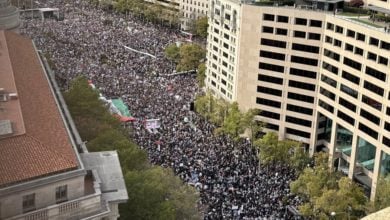Photo: Protesters against Chevron hold a banner that reads, “What did Chevron leave? Death and Destruction”. Credit — TeleSUR
Earlier this month, environmental lawyer Steven Donziger was sentenced to prison as a result of his work to bring justice to farmers and Indigenous communities in Ecuador who were the victims of the destruction of their land and water by Chevron. In 2011, Donziger was part of a team of lawyers who represented over 30,000 people in Ecuador against the company Chevron, after they dumped billions of gallons of cancer-causing toxic waste into water sources that the local people relied upon for drinking, bathing, fishing, etc.
The act of dumping the waste was not accidental, or even the result of neglect, but was rather a deliberate plan designed by Chevron in an act of environmental racism that completely disregarded the lives of the people impacted. This act of mass industrial poisoning continues to slowly cause the deaths of Indigenous Ecuadorians every day, and multiple Ecuadorian courts, including their supreme court, have ruled that Chevron pay $9.5 billion in damages. Despite this, Chevron has refused to pay and has instead attacked Donziger for his role in the case brought against them.
Following the ruling of the Ecuadorian Supreme Court, Chevron brought a RICO case against Donziger, ridiculously alleging that he engaged in bribery, racketeering, and a number of other offenses during his time working on the case against Chevron. Right-wing judge Lewis Kaplan ruled in favor of Chevron. The primary evidence in this case was the testimony of Alberto Guerra, an ex-judge from Ecuador who claimed that he had been bribed by Donziger to ghostwrite the verdict in the case brought against Chevron. However, Guerra and his family were brought to the U.S. and paid exorbitant amounts of money by Chevron to testify against Donziger, and in 2015 Guerra admitted to lying about the bribery, stating that the majority of his testimony was false. Despite Guerra’s admission, in 2016 Kaplan’s ruling was upheld by the court of appeals.
Kaplan, who has been criticized for pro-corporate bias in the case against Donziger, also charged him with criminal contempt of court. This was in response to the fact that when Kaplan ordered him to turn over to Chevron virtually all of his case files and client information from the Ecuadorian case against them, Donziger appealed the order, citing that it would be a breach of attorney-client privilege. When the Southern District of New York U.S. Attorney’s Office declined to prosecute the contempt case, Kaplan not only hired a private law firm that represents Chevron to prosecute, but also appointed right-wing judge Loretta Preska to preside over it.
Preska is a well-known member of the pro-corporate, far-right legal group The Federalist Society, which receives donations from Chevron. Once appointed, Preska denied Donziger bail, and put him under house arrest for over two years while he awaited trial. This is over four times the length of the maximum sentence for the charge Donziger was facing, and over eight times the average sentence of 90 days. Despite the length of time that he had already spent in house arrest, last Friday Judge Preska sentenced Donziger to spend an additional six months in prison.
The attack on Donziger by Chevron, and his resulting persecution by both Kaplan and Preska is a clear case of judicial bias being carried out on behalf of an oil corporation. Despite bringing devastation, environmental destruction, and death on the people of Ecuador, Chevron has faced no consequences. In contrast, Donziger has already been imprisoned for over two years for seeking to assist impoverished working class, mostly Indigenous farmers in holding the corporation responsible for the destruction of their water supply, and he has now been sentenced to another six months.
The injustices facing Donziger hold implications for anyone who fights back against powerful corporations. Everyone who cares about environmental justice has a stake in the fight against the abuses that Donziger is facing. Lawyers, activists, journalists, protestors, or anyone on the front lines of the battle for the environment could find themselves facing similar persecution. Chevron, Kaplan, Preska, and others hope to terrify people and prevent them from struggling on these issues.
But their attack also shows the desperation and fear that strike at the hearts of corporations and capitalists when the people mobilize and stand in solidarity with each other, as is the case in the long struggle to hold Chevron accountable for destruction in Ecuador. The ruling against Chevron showed what the power of the people can do, and those in power are using all of their resources to keep that lesson from spreading.





